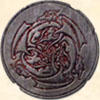Conjurer
The Conjurer is a specialist in the school of Conjuration. If a mage specializes in only the school of Summoner they take the title of Summoner. Conjurers tend to rely on summoned creatures to perform difficult tasks for them; hence, many conjurers grow flabby as the years pass. Many consider conjurers to be downright lazy. Since conjurers have little interest in associating with common people, they prefer to live in isolated areas of the countryside. Most consider children a nuisance, so even the few conjurers who marry typically remain childless by choice.
Aside from magical research, conjurers shun all activities that would normally constitute a career or occupation. When funds are low, conjurers can always summon creatures to fetch treasure for them.
Allowed Races: A wizard must have human blood to be a conjurer. Therefore, humans and half-elves can specialize in this school, but elves cannnot.
Ability Requirements: A wizard must have exceptional stamina to spend a lifetime casting conjuration and summoning spells, since he is at times tapping into his own life force in order to create conjured matter or lure summoned creatures. Therefore, a wizard must have a Constitution score of at least 15 to specialize in this school.
Saving Throw Modifiers: All opponents modify their saving throws by -1 when attempting to save against a conjuration or summoning spell cast by a conjurer. A conjurer adds a +1 bonus when saving against conjuration spells or attacks from creatures or forces created by summoning spells.
Bonus Spells and Acquired Powers: A conjurer can memorize an extra spell at each spell level, providing that at least one of the memorized spells is from the school of conjuration/summoning. When a conjurer reaches 17th level, he no longer requires any material components to cast conjuration and summoning spells. When a conjurer reaches 20th level, he gains the ability to instantly dispel creatures conjured by an opponent who has used a monster summoning spell or its equivalent. The conjurer can dispel up to 10 Hit Dice worth of creatures with this ability; only creatures with 5 HD or fewer are affected (therefore, the conjurer could dispel two 5 HD creatures or ten 1 HD creatures, but not a 6 HD creature). The conjurer can use this ability up to three times per day by pointing at the creatures to be affected and concentrating.
Oppositional Schools: A conjurer cannot learn spells from the schools of greater divination nor those of invocation/evocation.
Ethos: Because of the great power they wield, most conjurers are utterly convinced that their specialty is superior to all others. Illusion and divination are trivial, alteration and invocation are inconsequential, abjuration and enchantment are too weak, and necromancy is too repulsive. Though tending toward smugness and arrogance, conjurers are also confident, courageous, and bright. Conjurers recognize the importance of keeping evil in check, and most are of good alignment. Evil conjurers flourish, however, particularly those who maintain contact with evil entities summoned from other planes of existence.
Conjurers speak their minds freely and have little patience for the opinions of those they consider to be inferior; it takes a leader of proven worth and unyielding strength to earn the respect of a conjurer. In an adventuring party, conjurers tend to prefer action to discussion, and attacking to negotiating. Conjurers relish every opportunity for combat in order to demonstrate their power.
